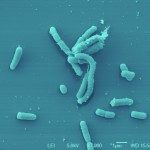Link to Pubmed [PMID] – 25339391
J. Clin. Microbiol. 2015 Jan;53(1):35-42
The genus Yersinia is a large and diverse bacterial genus consisting of human-pathogenic species, a fish-pathogenic species, and a large number of environmental species. Recently, the phylogenetic and population structure of the entire genus was elucidated through the genome sequence data of 241 strains encompassing every known species in the genus. Here we report the mining of this enormous data set to create a multilocus sequence typing-based scheme that can identify Yersinia strains to the species level to a level of resolution equal to that for whole-genome sequencing. Our assay is designed to be able to accurately subtype the important human-pathogenic species Yersinia enterocolitica to whole-genome resolution levels. We also report the validation of the scheme on 386 strains from reference laboratory collections across Europe. We propose that the scheme is an important molecular typing system to allow accurate and reproducible identification of Yersinia isolates to the species level, a process often inconsistent in nonspecialist laboratories. Additionally, our assay is the most phylogenetically informative typing scheme available for Y. enterocolitica.
